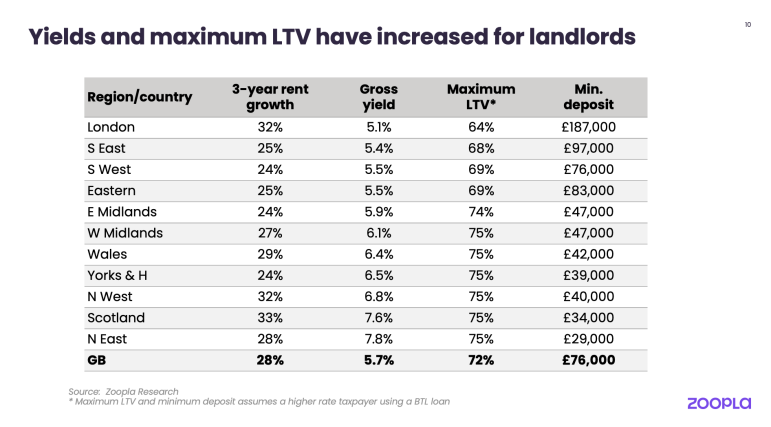
Landlords have been under the cosh for almost a decade from tax changes, greater regulation, rising costs and higher borrowing costs. Is the landscape for landlords about to turn?
Yields are rising as rental growth outpaces capital gains. Lower base rates into 2026 will reduce savings rates and we expect this will make higher yields from housing more attractive to investors, but only for the right homes.
Letting and management income is important, core revenue for estate agents.
Our analysis shows annual revenues are almost £10bn a year with a 50:50 split between letting and management and sales. The revenue bias to lettings is higher in London, closer to 70:30 given the size of the rental market and level of rents.
This highlights the importance of landlords to agents alongside the motivations to keep investing in housing.
While the stock of private rented homes in Great Britain has been static for the last 10 years, strong rental inflation has supported management income. Rents paid for older tenancies continue to reset to the market level.
Rents have risen by a third over the last five years and are much higher in some markets. Rents track earnings over the long run, so 2-4% annual rental inflation isn’t a bad underlying trend
While there is some industry concern over the Renters’ Rights Bill, half of landlords still don’t use estate agents for letting and management. The potential to grow income is even greater with the right marketing tactics.
A higher proportion of smaller landlords don’t use agents and prefer the DIY option. This is becoming risky with regulatory changes in Scotland and Wales and the Renters Rights Bill in England set to arrive soon. For those who like the cashflow but don’t like the extra processes and requirements, the value of a good agent only increases.
Many landlords who are selling tend to own one property and have never seen it as a business. Almost two in five landlords bought their first property to live in.
However, with seven in ten landlords aged over 55 years there is a challenge over the options for landlords that want to downsize or free up capital. Agents also want to see a new breed of landlords entering the market.
Where portfolio landlords want to sell, agents should look at the option for bulk sales to other investors to keep stock in the market rather than letting their own sales team or those of other local agents get their teeth into landlords looking to sell.
After a decade of the private rented sector rationalising and landlords embracing a cashflow focused business model – as opposed to chasing capital gains with maximum leverage – I believe we will see levels of investment starting to gain momentum once again.
Lower base rates will reduce the risk free rate and make gross yields from housing look more attractive. The underlying cashflow remains strong and will be the key motivating factor for new investment, especially in the mid market rental range.
If maximising borrowing remains important for some then the highest yields, and ability to take up to 75% LTV remain in areas outside southern England.
Whatever the strategy, landlords will want to buy homes that will be lower cost to manage and run, with a close eye on the likelihood of higher EPC ratings for rented homes being required from 2028.
Growing a base of landlords that prioritise the cashflow over the long run is the optimal route to growing a strong lettings and management book.
Richard Donnell, executive director, Zoopla
Read the orginal article: https://propertyindustryeye.com/will-lower-base-rates-see-more-landlords-investing-in-the-buy-to-let-sector/



